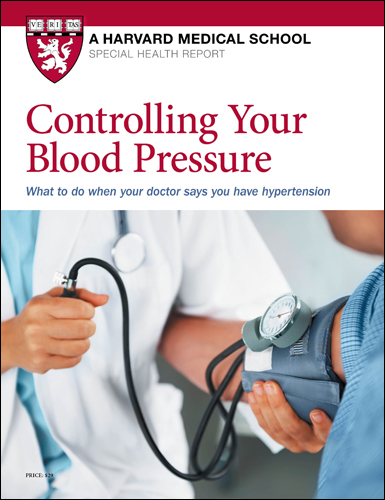What to do when your blood pressure won’t go down
Finding and treating underlying causes and making lifestyle changes will help.

Many people have high blood pressure in older age, and sometimes it’s hard to control. That problem is called resistant hypertension — blood pressure that stays above a set goal, such as 140/90 millimeters of mercury (mm Hg), despite taking three classes of blood pressure drugs (including a diuretic) at the highest tolerable doses. The condition is a major risk factor for stroke, heart disease, dementia, and more. What can you do to tame it?
Reassess all medications
Bring your doctor a list of all the medications you are taking, or bring a bag with all the medication bottles. Include over-the-counter drugs, vitamins, and supplements. The list, or bag, of medicines can help your doctor identify drugs or supplements that may be raising your pressure.
For example, taking nonsteroidal anti-inflammatory drugs (NSAIDs) such as ibuprofen (Motrin, Advil) can raise blood pressure. So can decongestants (such as phenylephrine found in many cold medicines), certain antidepressants, and corticosteroids. For example: "Alternative medications or physical therapy to relieve arthritis pain can decrease or eliminate the need for NSAIDs, helping reduce blood pressure in some patients," says Harvard cardiologist Dr. Deepak L. Bhatt, editor in chief of the Harvard Heart Letter.
Or the doctor may see that your medicines can be streamlined: fewer pills in total or fewer pills you need to take more than once a day.
Treat underlying causes
Underlying conditions can also keep your blood pressure high (see "What causes resistant hypertension?"). Getting them under control is essential. But figuring out if you have one can take detective work and a thorough physical evaluation.
For example, you may not know that you have a condition that boosts blood pressure, such as sleep apnea — pauses in breathing during sleep. Sleep apnea signs include chronic loud snoring, episodes where you stop breathing briefly (and perhaps gasp for breath), and being very sleepy during the daytime. A sleep study in a lab or at home (with a portable device) can provide answers.
What causes resistant hypertension?Resistant hypertension (high blood pressure that won’t go down despite treatment with multiple drugs) has many possible causes. Top reasons include consuming too much salt, which can make blood pressure medications less effective; and missing doses or adjusting them on your own. Other reasons include
|
Make lifestyle changes
You may need to ramp up healthy habits to maximize their effects. Start by eating a plant-based diet that’s low in salt; aim for less than 2,400 milligrams (mg) of salt per day. You should also be getting at least seven hours of sleep per night, limiting alcohol, avoiding smoking, and maintaining a healthy weight. "Sometimes losing just 5 or 10 pounds can make a meaningful difference in blood pressure for people who are overweight," Dr. Bhatt says.
And if you’re not exercising much, it’s time to start. Exercise boosts cardiovascular health in many ways. And a small, randomized trial published online Aug. 4, 2021, by JAMA Cardiology suggests that aerobic exercise (the kind that gets your heart and lungs pumping) may be another effective treatment for resistant hypertension.
In the study, people who walked, cycled, or both — for 40 minutes, three times per week, for 12 weeks — lowered their blood pressure by seven points in the top (systolic) number of their blood pressure measurement, and five points in the bottom (diastolic) number of the measurement, compared with people who didn’t exercise.
What else will help?
If these strategies don’t reduce your blood pressure, your doctor may feel it’s necessary to prescribe more pills. But don’t despair. "No matter what you are taking now, your doctor should be able to make affordable changes in your blood pressure medications to bring down your numbers," Dr. Bhatt says.
Image: © LifestyleVisuals/Getty ImagesAbout the Author

Heidi Godman, Executive Editor, Harvard Health Letter
Disclaimer:
As a service to our readers, Harvard Health Publishing provides access to our library of archived content. Please note the date of last review or update on all articles.
No content on this site, regardless of date, should ever be used as a substitute for direct medical advice from your doctor or other qualified clinician.
















